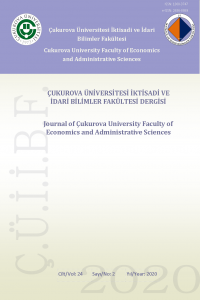Yönetişim Kalitesi ve Yönetişimin Ölçülebilirliği
1980’li yılların sonuna doğru önem kazanan yönetişim kavramı, Birleşmiş Milletler Kalkınma Programı’nda "Bir ülkenin her düzeydeki ilişkilerini yönetmesinde ekonomik, siyasi ve idari otoritenin uygulanması ve bu uygulamada vatandaşların ve toplumsal grupların çıkarlarının sağlanması ve yasal hakların kullanımı için gerekli mekanizmaların, süreçlerin kapsanması" olarak tanımlanmaktadır. Kavramın artan önemi ve uluslararası kurumların kavramı ölçmek için yaptığı çalışmalar, yönetişim kalitesini literatüre kazandırmıştır. Yönetişim kalitesi ise, yönetişim tanımında ifade edilen otoritenin, vatandaşların yaşam kalitesinde oluşturduğu etki şeklinde ifade edilebilir. Çalışmada, çeşitli uluslararası kuruluşların yönetişim kalitesi endeksleri, göstergeleri ile kavramın ölçülebilirliği incelenmektedir.
Anahtar Kelimeler:
Yönetişim kalitesi, yönetişimin ölçülebilirliği, yönetişim göstergeleri
Quality of Governance and Measurability of Governance
Governance which came to prominence at the end of 1980s, is defined as "the exercise of economic, political and administrative authority to manage a country’s affairs at all levels. It comprises the mechanism, processes and institutions through which citizens and groups articulate their interests, exercise their legal rights, meet their obligations and mediate their differences" in United Nations Development Programme. While governance concept comes to the question with studies made by international institutions in order to measure it, quality of governance brings in literature as well. Quality of governance is defined as authorities affect on citizens quality of life. In this study, measurability of governance is examined with variety international institutions quality of governance index and indicators.
___
- Acemoğlu, D., Robinson, J. A., & Johnson, S. (2001). The Colonial Origins of Comparative Development: An Empirical Investigation. The American Economic Review, 91 (5) , 1369.
- Acemoğlu, D., & Robinson, J. A. (2006). De Facto Political Power and Institutional Persistence. The American Economic Review, 96 (2), 325-330.
- Acemoğlu, D., & Robinson, J. A. (2012). Why Nations Fail: The Origins of Power, Prosperity, and Poverty. Crown Business. Great Britain.
- Boix, C., & Posner, D. N. (1996). Making Social Capital Work: A Review of Robert Putnam's Making Democracy Work: Civic Traditions in Modern Italy. The Weatherhead Center for International Affairs , 96 (4).
- Collier, P., & Gunning, J. W. (1999). Explaining African Economic Performance. Journal of Economic Literature, 37(1), 64-111.
- Diamond, J. (1997). Guns, Germs, and Steel: The Fates of Human Societies. W.W. Norton & Company. New York.
- Easterly, W. ve Levine, R. (1997). Africa’s Growth Tragedy: Policies and Ethnic Divisions. The Quarterly Journal of Economics, 112 (4), 1203-1250.
- Freedom House. (2014). Freedom in the World 2014 Methodology.
- Gallup, J. L., Sachs, J. D., & Mellinger A. D., (1998). Geography and Economic Development. Annual World Bank Conference on Development Economics, World Bank. Washington, DC.
- Hall, R. E., & Jones, C. I. (1999). “Why Do Some Countries Produce so Much More Output per Worker than Others? Quarterly Journal of Economics, 114(1), 83-116.
- Heritage Foundation. (2014). 2014 Index of Economic Freedom. 2014 Index of Economic Freedom: http://www.heritage.org/index/, Erişim Tarihi: (11.08.2014).
- Huther, J., & Shah, A. (2008). Applying a Simple Measure of Good Governance to the Debate on Fiscal Decentralization. World Bank. Washington.
- Inter-American Development Bank. (2014). Governance Indicators Databese. http://www.iadb.org/datagob/index.html. Erişim Tarihi: (22.05.2014)
- Johnston, M. (2008). Assessing the Progress of Anticorruption Efforts: Actionable Indicators of Reform. In N. Islam and M. Asaduzzaman (Ed). Ship Adrift: Governance and Development in Bangladesh, Bangladesh Institute of Development Studies, Dhaka.
- Kaufmann, D., Kraay, A., & Mastruzzi, M. (2005a). Governance Matters IV: Governance Indicators for 1996-2004. The World Bank. Washington.
- Kaufmann, D., Kraay, A., & Mastruzzi, M. (2005b). Measuring Governance Using Cross-Country Perceptions Data. Munich Personal RePEc Archive.
- Kaufmann, D., & Kraay, A. (2007). On Measuring Governance: Framing Issues for Debate. Washington: Issues Paper for January 11 th. Roundtable on Measuring Governance, World Bank, Washington, D.C.
- Kaufman, D., & Kraay, A. (2008). Governance Indicators: Where Are We, Where Should We Be Going?
- Kaufmann, D., Kraay, A., & Mastruzzi, M. (2008). Governance Matters VII:Aggregate and Individual Governance Indicators 1996-2007. World Bank Institute.
- Knack, S., & Keefer, P. (1997). Does Social Capital Have an Economic Payoff? A Cross-Country Investigation. Quarterly Journal of Economics , 112 (4), 1251-1288.
- Kraay, A., Kaufmann, D., & Mastruzzi, M. (2010). The Worldwide Governance Indicators: Methodology and Analytical Issues.
- La Porta, R., Lopez-de-Silanes, F., & Vishny, R. W. (1998). Law and Finance. The Journal of Political Economy, 106 (6), 1113-1155.
- La Porta, R., Lopez-de-Silanes, F., Andrei, S., & Vishny, R. V. (1999). The Quality of Government. NBER Working Paper 6727.
- Maldona, N. (2010). The World Bank's Evolving Concept of Good Governance and Its Impact on Human Rights. Stockholm, Sweden.
- Mo Ibrahım Foundation. (2014). www.moibrahimfoundation.org. Erişim Tarihi: (08.04.2014).
- Norris, P. (2011). Measuring Governance. In M. Bevir, For the Sage Handbook of Governance. SAGE Publication, 179-799.
- Ndulu, B. J., & O'Connell, S. (1999). Governance and Growth in Sub-Saharan Africa. Journal of Economic Perspectives, 13 (3), 41-66.
- Quibria, M. G. (2014). Governance and Developing Asia: Concepts, Measurements, Determinants, and Paradoxes. ADB Economics Working Paper Series, 388, Asian Development Bank.
- Putnam, R. (1993). Making Democracy Work. Princeton, NJ: Princeton University Press.
- Rauch, J. E. & Evans, P. (2000). Bureaucratic Structure and Economic Performance in Less Developed Countries. Journal of Public Economics, 75(1): 49–71.
- Ravallion, M. (2010). Mashup Indices of Development. Policy Research Working Paper No. 5432. World Bank. Washington, DC.
- Sachs, J. D. (2001). Macroeconomics and Health:Investing in Health for Economic Development. World Health Organization. 100
- ISSN: 1300-3747
- Başlangıç: 1987
- Yayıncı: Çukurova Üniversitesi
Sayıdaki Diğer Makaleler
Örgütsel İklimin Örgütsel Vatandaşlık Davranışına Etkisi. Bursa İlinde Bir Araştırma
Yönetişim Kalitesi ve Yönetişimin Ölçülebilirliği
Ebru CANIKALP, İlter ÜNLÜKAPLAN
Geçiş Ekonomilerinde Ekonomik Büyüme Farklılıkları
Harun BAL, Neşe ALGAN, Müge MANGA
Duygusal Zekâ ve Liderlik İlişkisi Bağlamındaki Çalışmaların Bibliyometrik Analiz ile İncelenmesi
